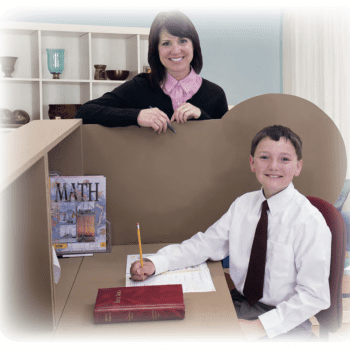I recently came upon this in an article about homeschooling in Alabama which included some comments about socialization that, as a homeschool graduate, I feel the need to address:
[Local homeschool mom] Million said that socialization with other children may be a bit overrated. She said that teaching children to communicate and socialize with adults is more important.
“They’re only going to be teenagers for a few years,” she said. “They’re going to be adults for the rest of their lives. What’s more important? Learning how to socialize with teens or how to socialize with other adults? How to shake hands and introduce yourself.”
I was homeschooled from kindergarten through high school, and I was told exactly this. And guess what? I got on with adults great! I knew how to introduce myself and shake hands and sound intelligent and impress the pants off of the adults I met. In contrast, the teens I met anywhere but our homeschool group scared me. They felt foreign, and I didn’t know how to relate to them. But that was okay! I didn’t need to know how to interact with them. I was about to be an adult, and I knew how to interact with adults.
Imagine my surprise when I became an adult … and so did all those teens I had no idea how to even communicate with. Suddenly, they were the adults I was supposed to be able to interact with. I hit college in a state of shock. After all those years of hearing that “peer socialization” was unimportant, it felt like the ground had been pulled out from under me. I cannot overemphasize how painful my first year of college was. I had to learn how to relate to and interact with the exact people I’d been avoiding all of my life—my public schooled peers.
What they don’t tell you is that even after you’re an adult, your age cohort continues to matter. Oh certainly, things broaden out, but most adult friendships are between individuals within a certain age range, and there’s a reason for that—you share a certain level of life experience and cultural background in common with those in your age cohort.
What they don’t tell you is that when you are an adult, relationships with other adults become peer relationships more similar to those between teens than they are to those between children and adults. My childhood socialization with adults helped diddly when it came to making friends and creating relationships with other adults as an adult.
What they don’t tell you is that socializing with adults as a child is more like interacting with a boss or much-older mentor as an adult. Adults relate to children differently than they do to other adults; learning to shake hands and introduce yourself to an adult, as a child, may help you with the scholarship committee, but not much else.
During college, I got on well with all of my professors. I asked questions during and after class, I came to office hours. I took a campus job as a teaching assistant after my freshman year, making copies and such. I took a campus job as a secretarial assistant, and interviewed professors for the departmental newsletter. All of this I could do.
However, being able to maintain professional relationships with my superiors said nothing about my ability to interact with my peers. What upset me most was how quickly others could identify me as strange and different. I didn’t mind being different. It wasn’t that I wanted to conform. It was just that I wanted to learn the language so that I could decide when I stuck out and when I didn’t. I applied myself learning how to understand and relate to my peers after a decade of distancing myself from them.
At one point I hoped this was just college. In its narrow age grouping, college was as artificial as I’d always been told high school was. I wanted to hack this problem regardless, but I held out hope that maybe things would be different after college. Ultimately I found that while things do change after college—you don’t live in such close quarters, you don’t have to keep seeing someone you don’t like (outside of work)—the basics of interacting with people, relating to people, and building relationships with people different from you don’t change.
And your age cohort still matters, even after college.
I was not confined to my home or deprived of friends as a homeschooled child. Here’s another quote from the same article about homeschooling; it’s something I could well imagine my mother saying about my own homeschool experience:
Hunt and other homeschooling mothers said that the idea that homeschooling results in socially inept children is a bit of a myth. Homeschooling doesn’t take place in isolation for most students, many are part of church groups and organizations that meet regularly. Many of the families interviewed for this story participate in such a group at Ridgecrest Baptist Church. Hunt said meeting with other homeschool families allows the children to socialize with peers.
Socializing your children in church groups and homeschool organizations only means that your children will be able to relate to and interact with the sort of children who attend church groups and homeschool organizations. Similarly, meeting with other homeschool families, as Hunt describes, allows your children to socialize with a very specific kind of peer—homeschooled ones. There is a big difference between socializing with other homeschoolers and socializing with your peers more widely. All of my friendships with other homeschoolers, my weekly church attendance, weekly Bible club, weekly homeschool co-op, weekly homeschool debate team—none of this prepared me in any way for socializing with non-homeschooled peers once I hit college.
Homeschooling parents like Million and Hunt cannot separate their children from their age cohort, socialize them only with other Christian homeschoolers, and expect that to have no impact their ability to relate to peers with whom they have never had contact. The irony is that I was always told that I was being raised to win souls for Jesus wherever I was. And yet, I didn’t know the culture. I didn’t know the social norms. I grew up hearing about missionaries working to learn the culture and social norms in the countries they were going to, so that they could evangelize more effectively. When it came to our own country, though, these rules didn’t apply.
I didn’t tell my mother about how painful that first year of college was, and it’s not as though she followed me there and watched me try and fail and try and fail. I knew homeschooling was profoundly important to her, and that she’d find some excuse to explain away what I was going through if I told her. Do Hunt and other homeschooling mothers give their children an opening to say these things? Are their children allowed to disagree? Are they even asked?
So, new rule. Every article that quotes homeschooling parents saying how well socialized their children are needs to include quotes about socialization from an equivalent number of young adults who were homeschooled. Why are homeschooling parents considered the experts on how well their children are socialized, especially given many homeschooling parents’ ideological commitment to homeschooling?
For further reading, you can see my previous posts about homeschooling and socialization here, here, here, here, and here. For those interested in a happy ending, I’ll note that I’ve finally hacked it. I don’t know whether it was gradually consuming enough pop culture that I no longer feel a divide there, or gaining the lived experience, but it took about ten years all told to reach a point where I no longer feel intimidated or out of my depth, or constantly worried that I would accidentally let something slip.















